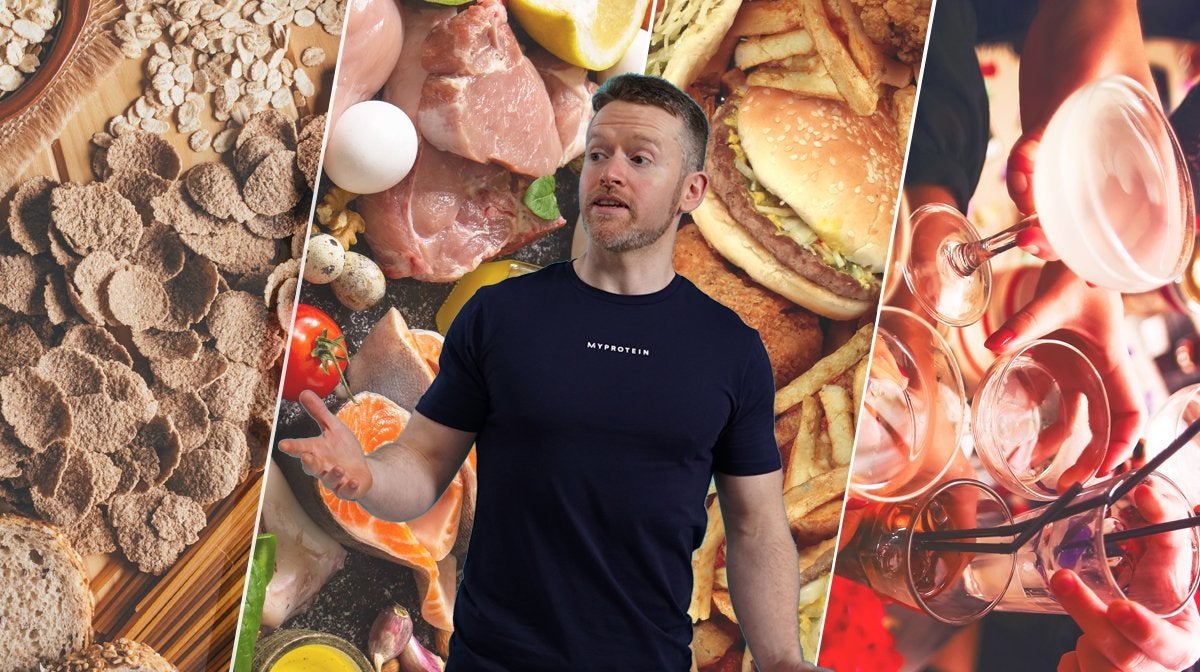Your Body Doesn’t Need Carbs To Function | Nutritionist Explains Macros

Macro friendly, macro splits, macro tracking: “Macros" are everywhere in nutrition. But what are macros, and why are they so important?
As usual, this is where nutritionist and nutrition researcher Richie Kirwan comes in to save the day. Macros in terms we can understand? Go on then.
What are macros?
As is often the case in nutrition, there’s an abbreviation in our midst. It won’t surprise you to learn that “macros” is short for macronutrients and comes from the Greek makro, meaning “large”.
Macronutrients are the nutrients we consume in large quantities and are usually measured in grams. There are three main macronutrients important to our diets: protein, carbohydrates and fats. (Technically speaking, alcohol is also a macronutrient, but it doesn’t serve an important role in a well-balanced diet.)
Micronutrients
Micronutrients are the smaller siblings of macronutrients. They are smaller nutrients like vitamins and minerals and are generally measured in milligrams or even micrograms.
Protein
First up, everyone's favourite macro. Protein comes from the Greek word protos, meaning “of prime importance”. It’s kind of a big deal, mostly because of the role it plays in several processes in your body. One gram of protein provides you with four calories of energy.
Proteins are made of long chains of smaller molecules called amino acids. They are called “amino” acids because all amino acids contain an amine group, which contains nitrogen; protein is the only macronutrient that contains nitrogen.
There are 22 amino acids in human nutrition. Nine of these are considered “essential” as the human body can’t make them itself and we must get them from our diets.
Protein is necessary for the growth and repair of various tissues. Essentially, your body is made up of protein in different forms. It's used to form your hair, skin, bones, ligaments and tendons and muscle. The structural function of protein is incredibly important.
Protein is also essential for the formation of enzymes, hormones, antibodies and other signalling chemicals in your body. All of these are proteins with very specific chemical functions. Our bodies are complex protein-based machines, and protein is required for so much more than simply building muscle.
Most whole foods have some amount of protein in them, but the amounts vary. 100g of lean steak can have about 25g of protein, whereas 100g of broccoli has about 3g of protein. One of the highest quality sources of protein available to us is milk protein, which includes whey and casein. These are both easy to digest and full of essential amino acids. Other options include eggs, fish, and lean meats. Or if you follow a plant-based diet, then tofu (soy) is a great option.
How much protein?
As a general rule of thumb, 1.2g of protein per kilogram of body weight per day is a good start. But your protein intake will vary depending on your goals. For example, if you’re building muscle you might need to eat between 1.6g and 2.4g of protein per kilogram of body weight per day.

'High-Protein Diets Are Dangerous' | Nutritionist Calls Fake News
Richie spills the tea.
Fats
Next up, fats, or lipids. This is the most energy-dense macronutrient, containing nine calories per gram. A smaller amount of fat can provide the same amount of energy as a larger amount of protein.
Fats and oils are both lipids. Fats are just lipids that are solid at room temperature, and oils are lipids that are liquid at room temperature. But Richie uses the word fats to cover both.
Fats are made up of chains of carbon atoms called fatty acids. Three fatty acids chemically joined to a molecule of glycerol form a lipid molecule called triglyceride. Fatty acids vary in length and in the double bonds they contain, and this can also alter the properties of the fats.
You’ll have heard of saturated and unsaturated fats. Saturated fatty acids generally come from animal sources, like the fat in red meat, dairy foods, eggs, coconuts, and palm oils. Unsaturated fatty acids can be found in olive oil, avocado, almonds and other tree nuts, sunflower seeds, peanuts, and more.
Fats are essential in their own way. They form the membranes around every cell in your body, so they have a structural role. They're a very efficient form of energy storage, otherwise known as body fat. And they help us to absorb fat-soluble vitamins A, D, E, and K. Fats also play an important role in the immune system and inflammatory responses, where the balance of omega 3 is crucial.

What is Omega-3? | Benefits, Side Effects & Dosage
Could this be the nutrient you're missing?
How much fat to have in your diet?
Again, it's entirely up to you how much fat you have in your diet. Richie isn’t here to tell you how to live your life and what to eat; he can only give you the facts. If you prefer more fat in your diet, it’s fine to have more. It’s still possible to lose and maintain weight this way, as long as you adjust your calories accordingly.
As a general rule of thumb, subtract 100 from your height in centimetres to get your daily fat intake in grams. For example, if you’re 180cm tall, your rough daily minimum fat intake will be 80g.
One thing to bear in mind is very low fat diets have been seen to have various negative side effects, like lack of energy, poor physical performance and decrease in sex hormones. With this in mind, Richie recommends avoiding dropping below 0.6g per kilogram of body weight of fat per day for more than a few weeks.
Carbohydrates
The third macronutrient — and my personal favourite — is carbs. One gram of carbohydrates provides you with four calories of energy, the same as protein.
Like the other macros, carbs are made up of smaller molecules joined together. The basic units of carbs are monosaccharides (or simple sugars, in layman’s terms), which join together to form disaccharides (two simple sugars) or polysaccharides (multiple molecules of simple sugars).
The three most common simple sugars are glucose, fructose, and galactose. A different combination of these sugars produces different polysaccharides. Much to my dismay, there’s no minimum requirement for carbohydrates in your body as they aren’t considered essential. But just because it’s not essential, it doesn’t mean it doesn’t have benefits.
The primary function of carbs is to act as an energy source, which is a role that can also be carried out by protein and fats. But without carbs, high-intensity exercise performance can take a dive. Most competitive athletes benefit from having carbs in their diet. If you’re a US The Office fan, think back to Michael Scott carb loading.
How many carbs should you have?
Some athletes eat as many as 12g of carbs per kilogram of body weight per day. For a 70kg athlete, that’s 840g of carbs every day. (I think I picked the wrong career).
But we’re not all athletes. Richie suggests using the remainder of your daily calories, after calculating protein and fats, on carbs. Again, it comes back to personal preference. Some people prefer more carbs and less fats; others prefer the opposite.
Sources of simple sugars include fruits, table sugar, honey, and juices. You can then get starch from cereals, potatoes, bread, legumes, and starchy vegetables.
Finally, we’ve got fibre. Fibre is technically a carb, but mostly indigestible to humans. Although in the small intestine our gut bacteria can produce short chain fatty acids from fibre, from which we can get some energy.
Alcohol
The wildcard of the macronutrients. It has seven calories of energy per gram, making it the second most calorie-dense macro. Besides being an energy source, alcohol doesn’t have any other health benefits.
Take home message
I hope that’s cleared up any confusion you may have had towards macros. And hopefully it’s also helped you to be more neutral towards foods, rather than just categorising them as “good” or “bad”. Calories are energy, food is fuel, carbs are useful, fats are essential, and we all already love protein. Tracking your macros allows you to realise that you can eat a lot of the foods you love and meet your goals at the same time. To me, that sounds like a win.
GET MORE FROM RICHIE HERE:

Surprising Way Appetite Is Affected By Fat, Muscle & Bones
Who knew? Our Nutritionist Richie, that's who, and he's explaining so we can all understand our bodies better.

Reduce Calorie Intake & Feel Fuller With Whole Foods
The whole food plant-based diet is something to write home about.











